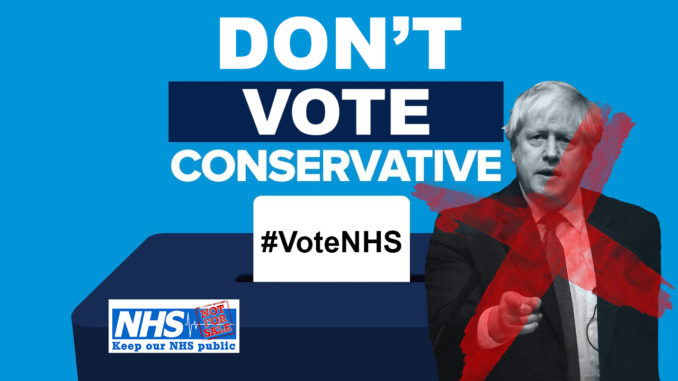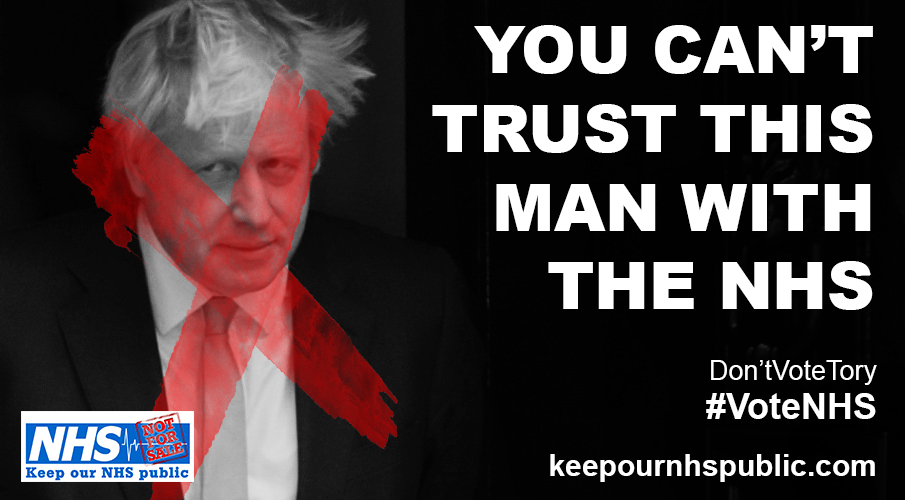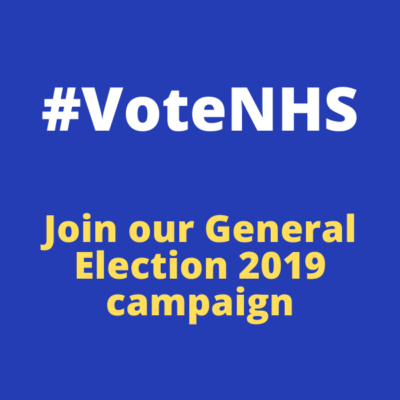
With a General Election coming on 12 December, it’s important that every voter has information to hand about the situation in our National Health Service. With the media fixated elsewhere, it’s up to us to make sure that the NHS is on every voter’s mind as they enter the polling booth – so here are ten things you should know:
1) The Prime Minister is lying – he offers no “extra funds”
Boris Johnson has suggested he will end the long decade of austerity in our NHS – but his promises fall apart under scrutiny.
We are glad you are enjoying some of our older articles. If you want to help Keep Our NHS Public out today, then please sign our #6demands for Covid19 petition at Change.org/NHS4All.
In August, he pledged £1.8 billion “extra” funding for NHS hospitals. As health workers, analysts and campaigners quickly pointed out, the “new” money wasn’t new at all – it was mostly transferred or recycled from other parts of the NHS budget. In any case, £1.8 billion would only reverse a tiny part of 10 years of cuts – a “drop in the ocean”, in the words of Ben Gershlick, Senior Economist at the Health Foundation.
In other words, Johnson is giving with one hand and taking with the other.
2) Much of the NHS is collapsing – literally
Another promise from Johnson in recent months was the pledge to “build 40 new hospitals.” Very soon observers were pointing out that the money proposed was nowhere near enough to deliver, and the offer shifted to an “upgrading” of 20 existing hospitals. Eventually, the promise was quietly rolled back to some building works at six existing hospitals.
This tawdry back-and-forth is taking place against the backdrop of an NHS which is quite literally falling to bits. For years, hospitals have been ordered to divert money from their “capital” budgets – intended for building works – to make up for cuts to their day-to-day staffing and operational funds. The result is decrepit, unhygienic buildings and infrastructure: 94% of NHS bosses surveyed have said the state of their buildings is so bad as to endanger patient safety. This is even the case in the Prime Minister’s own constituency, where Hillingdon Hospital has decayed so badly that child patients were evacuated recently for reasons of safety.
3) Our NHS is still “on the table” for a trade deal with Trump
In the face of massive public opposition, the Prime Minister has publicly disavowed the prospect of the NHS being laid open to US private healthcare interests in a future trade deal with Donald Trump’s government. The reality, however, is that US private firms already have lots of contracts with the NHS and are queuing up to take on support services for the integrated care systems that will decide how limited amounts of money can be spent and what services should be cut. In fact, while Johnson says one thing to voters, his government is saying the opposite to its US “partners”.
A recent Channel 4 Dispatches programme revealed that government officials are already having face-to-face meetings with US contacts, including representatives of the powerful and exploitative US pharmaceutical industry, about a deal involving drug price hikes and restrictive practices. A trade deal with the US is still Johnson’s only plan for how to reorient the UK economy after Brexit.
If Johnson has to tread carefully for fear of public opinion, his friends in corporate America and in the right-wing Trump Administration are far more open: again and again, they have expressed their desire to break up Britain’s “socialised system”, so that patients here can be charged sky-high prices for basic medications.
Small wonder that only 31% of the public believe that Johnson is telling the truth about his US liaison and our NHS.
4) The NHS is now critically under-staffed
Ten years of destructive cuts have left our NHS short of 100,000 hospital and community staff, including 40,000 nurses and 10,000 hospital doctors, and a further 7000 GPs. The impacts of this are obvious: longer waiting times and a service that runs on the goodwill of self-sacrificing staff. A majority (58%) of NHS workers do unpaid extra hours every single week to keep services afloat.
5) Health workers are under attack and stretched to breaking point
Instead of giving NHS workers the resources they need to deliver services, government ministers for the last decade have set staff up for failure with impossible targets and have undermined morale using blame games and division tactics. They aim to deflect responsibility for their own destructive policies.
The impacts are clear in the latest NHS Staff Survey: 78% of NHS workers feel under unrealistic pressure in their work; more than half want to leave their current job; and a fifth want to leave the NHS altogether. Shockingly, the suicides of hundreds of nurses and doctors are well above the national average.

6) Privatisation is still going – and gathering pace
The Health and Social Care Act 2012 had a single purpose: to force the opening-up of all NHS services to private healthcare providers. While the NHS remains in place and the vast majority of healthcare is still publicly funded, 18% of the NHS budget goes to the private sector; private providers now control many services and extract a profit from running them, diverting money away from patient care. And haemorrhaging of NHS funding to private providers is rising fast.
Private firms are getting bolder and bolder in trying to grab hold of NHS contracts and NHS funding - often with the help of government-appointed national NHS managers. One shocking example this year was the decision by NHS England to force through a private contract to take over specialised NHS cancer PET-CT scanning in Oxfordshire, riding roughshod over the clear opposition of local patients, health commissioners and elected councillors. In some cases, we've even seen private providers try to sue the NHS for refusing to renew their lucrative contracts after years of malpractice.
7) The “Hostile Environment” is hurting, not helping, our NHS
In 2015, the government introduced charges for migrant patients using most NHS services, and required NHS trusts and health workers to check patients’ IDs and administer these charges. This was an extension to the NHS of the “Hostile Environment”, a set of policies designed to force workers across the public sector to act as border guards and monitor service users’ migration status.
Four years on, it is clear that these policies can be lethal to migrant patients. On 23 October, health workers across the country protested the two-year anniversary of the introduction of up-front charges, and held vigils for those who have lost their lives after being denied essential healthcare under these policies.
Voters should also be aware that such policies are devastating to the NHS itself, in at least two respects: they damage staff morale and the spirit of solidarity which are essential to the service; and they alienate and undermine the huge number of migrant health workers who are key to the NHS’ success, without whom the whole service would grind to a halt.
8) There is no plan for social care
Britain’s social care system is badly broken and needs a radical overhaul. £8bn has been stripped from annual budgets and over 1 million people in need no longer received personal social care. Many agree that integrating social care with healthcare would be desirable – but in practice, the government is running down healthcare towards the level of under-funded, piecemeal social care provision, rather than moving forward to a comprehensive social care system on the model of the NHS.
Shortly after becoming Prime Minister, Boris Johnson announced:
"We will fix the crisis in social care once and for all, and with a clear plan we have prepared to give every older person the dignity and security they deserve."
As with so much else, however, the Prime Minister has given no details of his supposed “clear plan”. Given his party’s previous attempt to instate a “dementia tax” on social care users, we should be wary about the exact nature of Boris Johnson’s solution, especially as he has not yet seen fit to share it with the public.
9) Britain is facing a mental health crisis - and it’s the Tories’ fault
In 2018, suicides in the UK jumped a horrifying 11.8% from the previous year’s total, reaching their highest level in 20 years; tragically, over 200 school-age children, and 730 young people more broadly, were among those who took their own lives. It’s no secret that the severe shortage of mental healthcare services and the withdrawal of welfare and basic public services from vulnerable individuals have done much to exacerbate the crisis.
During Theresa May’s tenure, Keep Our NHS Public was among many critics who pointed out that her warm words and apparently understanding statements around mental health stigma did not prevent her from cutting vital frontline services for people in need. Under Johnson, it seems that even the appearance of a caring approach has now disappeared, with the new Prime Minister asserting, that “hard work” is the cure to mental health problems.
The brutal reality is that the mental health crisis will carry on until Johnson and his party are replaced in government.
10) The current state of the NHS is the outcome of government policy. It doesn’t have to be like this.
The last ten years have seen a ruthless and dogmatic drive from Westminster for austerity policies across the public sector, including in our NHS. As a widely-loved symbol of the welfare state and the limits of profit-making in our society, the NHS is a fundamental challenge to Conservative ideology that holds that the "free market" is the ultimate route to prosperity and wellbeing. The economic logic behind austerity has been debunked by mainstream economists. Yet UK government austerity measures have been implicated directly as a contributory cause of 130,000 ‘preventable’ deaths - and austerity grinds on.
Some of the most vocal advocates of this perspective have been the very Tory politicians put in charge of the NHS over the last ten years. For example, former Health Secretary Jeremy Hunt co-authored an entire book which called for the NHS to be replaced with private insurance; Boris Johnson himself argued, before his entrance into front-bench politics, that there was a "moral [and] economic" need to charge for healthcare; and Andrew Lansley, the Health Secretary who oversaw the Health and Social Care Act, now works for several different private healthcare and pharmaceutical companies.
Politicians have often made the case for privatisation by suggesting that the NHS is inefficient and consumes huge amounts of funding compared to systems that feature more private health provision. The truth is that the UK spends less on healthcare than most other comparable governments. We now have a 10-year Long Term Plan for the NHS that breaks the national service into 44 pieces and is focused on cost containment through cuts, and reducing accountability through promoting Integrated Care Systems. The newly merging super-CCGs have the potential to award a contract for integrated care systems to a single Integrated Care Provider, along the lines of ACOs with a fixed budget and run under a single long-term contract that could be held by a private company. And this we will oppose all the way
Commercialisation of the NHS, with commissioning of contracts and the expansion of private sector interests, is responsible for at least £4.5bn and possibly up to £15bn or more per year in avoidable costs. There is no reason we can't have world-class healthcare, but we can't achieve it with scant resources and funding haemorrhaging away wastefully. We need a change of government to get the profit-seeking firms out of our healthcare system and give health workers the support and resources that they need to succeed. That's why we're saying:








Fine words indeed! However, I would challenge your argument in paragraph 7. I don’t have an issue with charging immigrants up-front and also checking their IDs. This only brings us in line with the rest of the world and reduces the abuse of our already overloaded system.
Stuart,
Do you have an issue with what happened to any of the individuals (Sylvester Marshall, Nasar Ullah Khan, Saloum, Esayas Welday, Elfreda Spencer, Kelemua Mulat) mentioned in this article?
https://www.opendemocracy.net/en/ournhs/ournhsanother-key-johnson-claim-nhs-demolished/
Sorry, but you’re just another leftie pressure group spreading the lie that the Tories are going to sell off the NHS. As a patient I’ve seen huge inefficiencies in this public-sector dinosaur that seem to disappear when the private sector gets involved – because they have an incentive to make things work. I want a national health service, not a national health organisation that’s more concerned with its own people than with its customers.
Sorry but I’ve been on the private sector providing NHS services and their bottom line is profit not safety, patient focused care etc. The hospital I worked at had a policy of shipping patients who became unwell post op out of the door as fast as they could so that they a didn’t have the expense of caring for an ill patient, b didn’t have to record adverse events to the CCG and c didn’t have staff qualified to care for sick patients because they cover everything with HCAs earning barely minimum wage, instead of properly qualified staff.
They have an incentive to make a profit they have to profit from pain fear and suffering,.why not sell of the Royal Navy Army Air Force
Doctors and nurses and others in the NHS are they not motivated by something other than profit is there nothing else in your thought world why not make a profit out of your family ?
The is not scientific evidence that profit is more efficient than dedication and as sense of duty and care Aristotle made a clear distinction between economics for use the economics for gain – so he got it wrong ?
Dorcn
This post is utter clap trap – No party has any additional funds for the NHS within current budgets. Labour intend to print money and plunge the country into terrific debt.
As for the comments re the way the NHS treat migrants – this is a perfectly reasonable approach. Nearly all EU countries charge for services and then cross bill the EU country. Except the UK, we give it all away.
I support our NHS, I believe in free treatment for those who are part of our country (UK) or part of our affiliates (EU or crown dependencies were reciprical billing for medicare is in place). For everyone else – get insurance and carry it with you, or have a credit card big enough to stand the bill.
Steve – the NHS works because of unconditional solidarity and the principle that people who need healthcare should be able to access it (unlike, for example in the worse-than-Dickensian mess that is the US system, where social solidarity doesn’t enter into it). Get rid of that for some people, and you undermine it for everyone. We stand together on this, or we don’t stand at all. Concede that some people’s healthcare should be dependent on their wallets, and it won’t be long until yours becomes so as well.
This is not an abstract argument, people have already died due to being denied healthcare under the Hostile Environment. Health workers don’t want to administer border regimes in their workplaces either, it is fundamentally contrary to the job they sign up for. We need to let them do their jobs, get borders out of our health service, and reassert the principle that we do not play divide-and-rule politics with people’s lives, their children’s lives, and their ability to access life-saving medical care.
(Even if what you were saying where justifiable on other scores – there is no NHS without migrant health workers. None. Get rid of them and literally the whole thing grinds to a halt within an hour. So the real question is why our politicians are so determined to implement anti-migrant policies that they are willing to sacrifice our health service on that altar.)
The entire healthcare system is built around profit. There is no money in healthy people, there is no money in dead people. There’s money in sick people.
If they really cared they would spend more time and money educating people in the right foods to support immune systems and a healthy level of exercise to keep your heart ticking.
Instead they just try to find a treatment for the humans unhealthy habits rather than stopping it at the source. An example, severely overweight people are at very high risk of type 2 diabetes. It has been scientifically proven that a healthy diet rich in micronutrient foods will avoid this and can even reverse it. Yet the NHS spends unlimited amounts paying for said persons “treatmemt”. Educate them and make their habits change at the risk of them having to pay for their own treatments should they not want to pay off the high fat and sugar processed foods.
I genuinely support the NHS but would be happy for them to be an emergency only service, e.g. car accidents etc.
This would then make a much less burden on their finances and might actually make people consider their lifestyle choices a little more…
I’m not suggesting I am right nor looking for an argument, but there has to be other ways of dealing with this. Sometimes the solution isn’t always throwing more and more money at something.
THE DRUG INDUSTRY IS A BUSINESS, THAT WANT PROFIT. THEY NEED PEOPLE TO BE SICK.